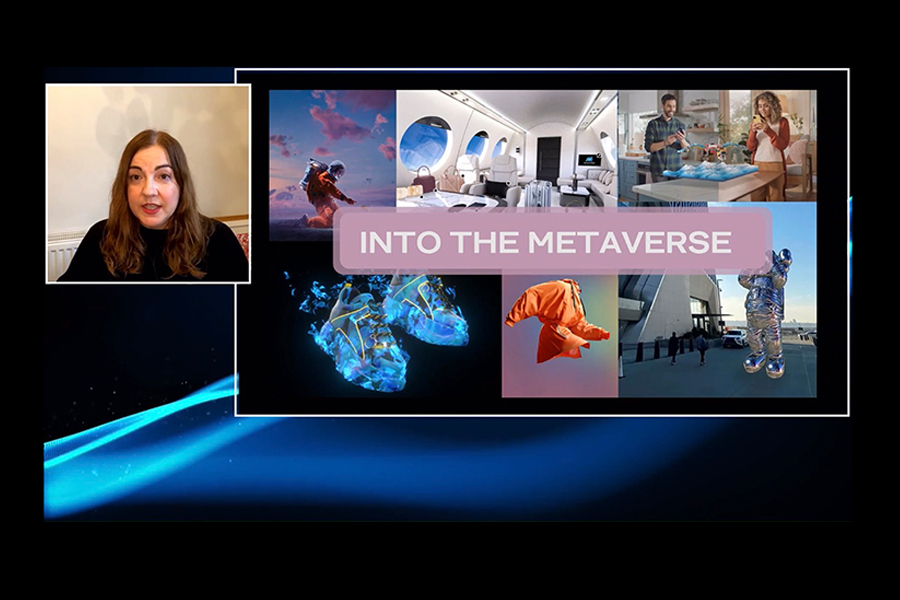Marie Stafford: The four trends that will define 2022
- 22/12/2021, 16:56
- SHARE

Fortune Greece Network had the pleasure this week to host Marie Stafford, Global Director, Wunderman Thompson Intelligence, who, during her talk titled “Emerging Trends from the Future 100” conveyed to the members of the community the international trends that are expected to change the way we work and live.
Marie has been widely quoted as an expert on future issues in publications such as the Financial Times and the New York Times, among others. She regularly works with Wunderman Thompson’s top 30 clients to apply future thinking in a brand- and company- relevant context.
Marie Stafford was welcomed by Desy Karapchanscka, Operations & Communications Manager of FortuneGreece Network and Irini Nikolopoulou, co-CEO Wunderman Thompson Greece.
Here are some key points of the presentation:
The four patterns of the Future 100 survey
Marie Stafford started her talk by listing the four most important trends elaborated by Wunderman Thompson Intelligence’s report for 2022 and beyond. First, she stressed that we are currently experiencing not one but two existential crises, around climate change and public health. At the same time we are experiencing a “technology rush” that has caught many of us by surprise, and has put us in the uncomfortable position of having to adapt to these new technologies immediately.
In the context of these changes, the beginning seems to be the spread of the so-called Metaverse. “We see the rest of the world as a series of interconnected virtual spaces that can also be connected to the real world. And we will increasingly, as we move into the future, be able to move seamlessly between these virtual worlds, taking our identity with us”. This is how she defined the new technology that we’ve been hearing about for many years, and was the next big thing for quite a long time, but is now starting to be launched on a global scale and is becoming more mainstream.
She cited some impressive figures that have already appeared in this new world, with users willing to pay very large sums of money to acquire virtual goods. Research by Wuderman Thompson showed, for example, that participants would spend almost $3,000 on a digital bag from a well-known designer, whereas in the real world it is worth less money. She described this trend as a great opportunity for companies to create virtual products that not only unlock new revenue streams, but also offer valuable insights for their launching in the real world. She also mentioned the world of video games, where this commercial model has already been in operation for years, generating huge revenues for companies in the sector.
The work experience will never be the same again
Then, Marie Stafford documented the very big changes that we are experiencing in the way we work, referring for instance to the launch of Mesh for Microsoft Teams, in which employees will create avatars that will be taken to virtual workspaces and business meetings around the world. Such interventions are expected to become integral parts of the hybrid work model that we have been driven to by the pandemic restrictions.
But she also observes the creation of a two-tier workplace, with most women working from home and most men from the office. This is something that she is very much afraid of, as it may stigmatize the idea of working remotely, especially given the fact that the return to work for men already seems to be reaching the pre-pandemic levels, while for women the recession in work continues. So, to avoid this stigma, Marie Stafford noted that several companies are already tracking pay increases between those who work from home and those who go to their offices.
Generation Z protests
In the third trend to look to in the future, Marie Stafford pointed to Generation Z and how they are asserting their rights now that they are taking their first steps into the workplace. Teens and adults in their early 20s, now the largest generation globally, are bringing into the workplace a self that has been shaped in the digital world in which they have lived their entire lives. That alone changes everything, Marie said, because the way they spend money is incredibly targeted, unlike any other generation we’ve seen in the past. “They really want brands to be about more than profit and they want to be proud of the brands they buy. They think very carefully about where their money goes. Who is behind the brand? What do they stand for? Who are they supporting? Who are they not supporting?” In this year’s Wuderman Thompson survey, Regeneration Rising, you can see a clear trend in the consumer consciousness of young people, who are clear about those businesses that leave no positive mark on the environment and society: they will exclude them.
Generation Z is also a generation that is rebelling through very different means than in the past. One of the examples given by Marie Stafford concerns climate change, and the voices of young people who are amplified through digital platforms and have made older generations rethink their policies on many levels.

Optimism is not an unknown word
Turning to the latest trend worth monitoring for 2022, Marie Stafford focused on Generation Z’s optimism about the future, especially considering that they grew up and came of age in conditions that can only be described as less than ideal. “After almost two years, people are starting to look for positive developments. So, we see cultural messages shifting towards positivity. We see brands starting to be more uplifting in the stories they tell, and we think that this will shift towards upliftment, life affirmation and mood boosting. We are not going to be blind and deny that we have huge challenges and problems to solve, but at the same time we can celebrate the resilience that has been shown and our humanity”.
She cited “bursts of colour” in public spaces or theme parks as an example – colours that are used to change people’s mood and give more optimism. Through colours, Marie Stafford sees that brands are beginning to speak to their consumers.
